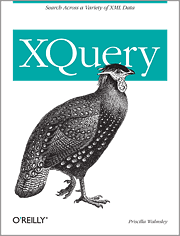fn:lang
Tests the language of a node
Description
The fn:lang function tests the language of a node, which is determined by the existence of an xml:lang attribute on the node itself or among its ancestors. This function can be used on any node, not just one containing string values. It is often used in the predicates of path expressions to filter data for a particular language.
The $testlang argument specifies the language to test. The function returns true if the relevant xml:lang attribute of the $node has a value that matches the $testlang value. The function returns false if the relevant xml:lang attribute does not match $testlang, or if there is no relevant xml:lang attribute.
The relevant xml:lang attribute is the one that appears as an attribute of the context node itself, or of one of its ancestors. If more than one xml:lang attribute can be found among the node and its ancestors, the nearest one applies.
The matching process is case-insensitive. If $testlang is en, it matches the xml:lang value EN, and vice versa. Also, the value of the xml:lang attribute can be a sublanguage of the $testlang value. For example, en-US, en-UK, and en-US-UK are all sublanguages of en. Therefore, if $testlang is en, and xml:lang is en-US, the node will be matched. This does not work in reverse; if $testlang is en-US, and xml:lang is en, it will not match.
This description is © Copyright 2007, Priscilla Walmsley. It is excerpted from the book XQuery by Priscilla Walmsley, O'Reilly, 2007. For a complete explanation of this function, please refer to Appendix A of the book.
Arguments and Return Type
| Name | Type | Description |
|---|---|---|
$testlang |
xs:string? |
the language to test for |
$node |
node() |
the node to test; otherwise uses the context node |
| return value | xs:boolean |
Examples
<xsl:variable name="in-xml" as="item()*"> | ||
| ||
</xsl:variable> |
| XPath Example | Results |
|---|---|
$in-xml//
desc[lang('en')] |
<desc xml:lang="en-US">
<line>A line of text.</line>
</desc> |
$in-xml//
desc[lang('en-US')] |
<desc xml:lang="en-US">
<line>A line of text.</line>
</desc> |
$in-xml//
desc[lang('fr')] |
<desc xml:lang="fr">
<line>Une ligne de texte.</line>
</desc> |
$in-xml//
desc/line[lang('en')] |
<line>A line of text.</line> |
$in-xml[lang('en-US')] |
() |
$in-xml//
desc[lang('FR')] |
<desc xml:lang="fr">
<line>Une ligne de texte.</line>
</desc> |
History
| Published On | Last Updated | Contributor(s) |
|---|---|---|
| 2006-06-27 | 2007-02-26 | W3C, XQuery 1.0 and XPath 2.0 Functions and Operators, http://www.w3.org/TR/xpath-functions/ |

